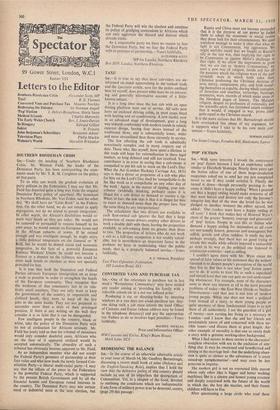Letters to the Editor
Southern Rhodesian Crisis Alexander Scott, MP Taxi! R. E. Thomas Converted Vans and Purchase Tax Maurice Nockles Redressing the Balance Sir Norman Angell 'Pop' Fiction J. Delves-Broughton, Shiela Steen Method Schools Charles Marowitz The Early Welsh Church Rev. J. Jones-Davies In Hungary Edward Gillott Sakiet N. Travers John Betjeman's Schooldays 'Benjamin Atkins' Television Plays Philip Mackie Webster's World Meredith Whittaker SOUTHERN RHODESIAN CRISIS SIR,—Under the heading of 'Southern Rhodesian Crisis,' Mr. Winston Field, the leader of the Dominion Party, has been contraverting the state- ments made by Mr. T. R. M. Creighton on the policy of that party. To us who can watch the gradual evolution of party policies in the Federation, I may say that Mr. Field has departed quite a long way from the original Dominion Party policy of apartheid. His lieutenant in Northern Rhodesia, Mr. Van Ecden, said the other dajr, 'We shall have no "Little Rock" in the Federa- tion. On the other hand, we do not intend to apply segregation, nor do we intend to permit integration.' In other words, the African's disabilities would re- main very much as they are today. He would not be removed or persuaded to remove himself to his own areas; he would remain on European farms, and in the African suburbs, of towns. If he earned enough and was intelligent enough, he might enjoy a little political integration on the General or 'A' Roll, but he would he denied social and economic integration. In the face of a powerful European Railway Workers' Union, he could not become a fireman or a shunter on the railways, nor could he enter such hotels or cinemas as were not specially provided for him.
It is true that both the Dominion and Federal Parties advocate European immigration on as large a scale as possible in order to strengthen the hands of the European community. They recognise that the weakness of that community lies in its rela- tively small numbers. They not only want to keep the government of the country in responsible and civilised hands, they want to keep all the key jobs in the same hands. They are not prepared to surrender more than a tittle of their privileged position. If there is any writing on the wall they consider it is so faint that it can be disregarded.
Few intelligent people in the country, black or white, take the policy of the Dominion Party with its test of civilisation for Africans seriously. Mr. Field has lately told us that the tribunal of examiners would only consider doubtful cases. Africans who on the face of it appeared civilised would be accepted automatically. The absurdity of such a tribunal has obviously become apparent to Mr. Field.
As an independent member who did not accept the Federal Party's promises of partnership at their face value and who now leads the newly formed Con- stitution Party—a liberal multi-racial party—I may say that the villain of the piece in the Federation is the powerful Federal Party, which is supported by the present British Government and by all the financial houses and European vested interests in the country. The Dominion Party may win certain rural or industrial seats at the next election, but the Federal Party will win the election and continue its policy of grudging concessions to Africans which can only aggravate the discord and distrust which already exists.
As a responsible party we have no reason to fear the Dominion Party, but we fear the Federal Party with its pretence of partnership.—Yours faithfully, ALEXANDER SCOTT MP for Lusaka, Northern Rhodesia Box 1059, Lusaka, Northern Rhodesia


































 Previous page
Previous page